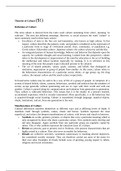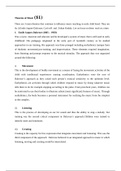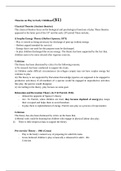comparative education
Machakos
All 37 results
Sort by
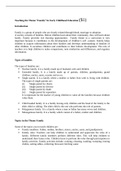
-
Teaching the Theme family
- Class notes • 3 pages • 2018
-
- $2.99
- + learn more
Introduction Family is a group of people who are closely related through blood, marriage or adoption. A society consists of families. Before children learn about their community, they will learn about family. Family provides rich learning opportunities. Family theme in a curriculum is very important because it contributes to the development of children’s self –esteem. Family helps children to acquire information about their families and develops understanding of families of other childre...
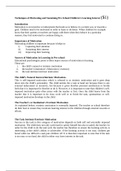
-
Techniques of Motivating and Sustaining Pre-school children
- Class notes • 5 pages • 2018
-
- $2.99
- + learn more
Introduction Motivation is an incentive or inducement that leads us to behave in a certain way or towards a goal. Children need to be motivated in order to learn or do better. When children for example know that their parents or teachers are happy with them when they behave in a particular manner, they feel motivated to continue doing so.
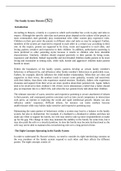
-
The Family System Theories
- Class notes • 11 pages • 2018
-
- $2.99
- + learn more
Introduction According to Bowen, a family is a system in which each member has a role to play and rules to respect. Although the specific roles that each person plays depend on the culture of the people, in most communities men generally play instrumental roles while women play expressive roles. Children on their part assist the parents in different roles and tasks as may be assigned. Further, members of the system are expected to respond to each other in a certain way according to their role.
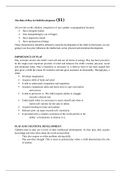
-
The Role of Play in Child Development
- Class notes • 9 pages • 2018
-
- $2.99
- + learn more
The Role of Play in Child Development All over the world, children, irrespective of race, gender or geographical location: Have energetic bodies Like manipulating by use of fingers Have inquisitive minds Have spontaneous feelings These characteristics should be utilized to assist the development of the child. In this lesson, you are going to see how play influences the intellectual, social, physical and emotional development.
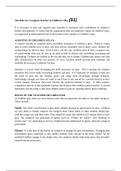
-
The Role of a Caregiver in children's play
- Class notes • 5 pages • 2018
-
- $2.99
- + learn more
The Role of a Caregiver/Teacher in Children’s Play It is necessary to plan and organize play episodes to maximize their contribution in children’s holistic development. To ensure that the organization does not negatively impact on children’s play, it is important to understand the role of the teacher or the caregiver in children’s play.
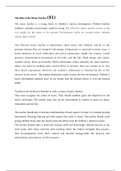
-
THE ROLE OF THE MUSIC TEACHER
- Class notes • 7 pages • 2018
-
- $2.99
- + learn more
The Role of the Music Teacher The music teacher is a strong factor in children’s musical development. Without him/her children’s attitudes toward music could be wrong. The effective music teacher serves as the live model for the music to be learned. Performance skills are learned when children imitate their teacher.
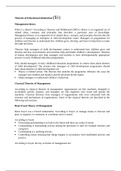
-
Theories of Educational Administration
- Class notes • 6 pages • 2018
-
- $2.99
- + learn more
What is a theory? According to Hearron and Hildebrand (2003) a theory is an organised set of related ideas, concepts, and principles that describes a particular area of knowledge. Management theory is an organised set of related ideas, concepts, and principles that describe the process of managing an enterprise or child development centre. Managers of programmes for children read theories to understand how children grow, develop, and learn to help them to make the right decisions.
The term culture is derived from the Latin word cultura stemming from colere, meaning "to cultivate". The term has different meanings. However, in social sciences the word "culture" is most commonly used in three basic senses:
Theories of Music There are 3 main theories that continue to influence music teaching in early child hood. They are by i) Emile Jaques-Dalcroze, Carl orff and Zoltan Kodaly. Let us focus on them each at a time.
These theories appeared in the latter part of the 19th and the early 20th period These include; i) Surplus Energy Theory (Herbert Spencer, 1873)

$6.50 for your textbook summary multiplied by 100 fellow students... Do the math: that's a lot of money! Don't be a thief of your own wallet and start uploading yours now. Discover all about earning on Stuvia



